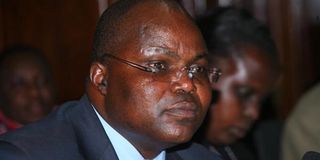Issack Hassan ‘tried to sway BVR tender’

Dismas Ong’ondi, a former ICT director at the Independent Electoral and Boundaries Commission, facing the National Assembly’s Public Accounts Committee in Nairobi on July 21, 2015. PHOTO | EVANS HABIL |
What you need to know:
- Former ICT director gives House team evidence on the failure of the electronic voting plan.
- Sacked official accuses electoral agency boss of introducing him to an interested party.
A former top electoral commission official on Tuesday claimed that Chairman Issack Hassan tried to influence a tender for the Biometric Voter Registration (BVR) kits in the 2013 elections.
Mr Dismas Ong’ondi, a former ICT director, named the Independent Electoral and Boundaries Commission boss when he gave evidence before the National Assembly’s Public Accounts Committee (PAC).
He was giving evidence on the failure of electronic voter identification devices, the rushed procurement of biometric kits, and the failure of the electronic results transmission system that raised credibility questions.
“He (Mr Hassan) introduced me to representatives of Avant International Technology, which had interest in the tender in June 2012, during a commission retreat in Mombasa,” he told the committee.
Mr Ong’ondi, who was sacked by the commission after he advised against procurement of voter identification devices, also blamed Mr Hassan for proceeding with the procurement in spite of advice against it by the ICT department and that of an external IT consultant – International Foundation for Electoral Systems – that the system was likely to fail during the elections.
UNDER OATH
PAC Chairman Nicholas Gumbo (Rarieda MP) asked Mr Ong’ondi to furnish the committee with evidence to back his claims. Mr Gumbo said the committee took it that he was speaking the truth since he was under oath.
Also mentioned as having allegedly tried to influence the tenders is electoral agency commissioner Mohammed Alawi, who also reportedly introduced Mr Ong’ondi to representatives of a firm so that it could get favourable consideration.
The former official also accused Mr Hassan of ignoring advice to procure only 9,750 biometric kits, which were enough to register voters, and instead went for 15,000.
Tongareni MP Eseli Simiyu called the commission’s promise to Kenyans that the elections would be electronic a monumental hoax. He blamed the electoral agency for procuring electronic voter identification and transmission systems, which failed during the elections.
“The fact that the commission raised the expectations of Kenyans that the electronic voter devices would work, when they knew they would fail, can only amount to a monumental hoax,” said Dr Eseli.
It also emerged that Kenyans may have gone to the 2013 elections with an uncertified voter register after Mr Ong’ondi revealed that due to time constraints, the ICT department transferred unverified voter information from the biometric register to the electronic voter identification devices.
Balambala MP Abdikadir Aden said the use of the unclaimed register could probably explain why many voters found their names missing from the electronic identification system, even though they had been registered.
The MPs also queried the credibility of the elections following revelations that uncertified voter details may have been fed into the electronic system, which partially worked during the polls.




